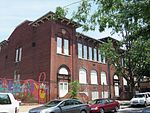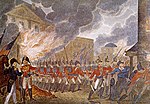So Others Might Eat
1970 establishments in Washington, D.C.Charities based in Washington, D.C.Homelessness charitiesOrganizations established in 1970

So Others Might Eat (SOME) is a nonprofit organization that provides services to assist those dealing with poverty and homelessness in Washington, D.C. The organization provides affordable housing, job training, counseling and other healthcare services, and daily needs such as food and clothing to the poor and homeless. It spends the largest portion of its annual budget on affordable housing, with a majority of its residents recovering from addiction. SOME describes its mission as helping "our vulnerable neighbors in Washington, DC, break the cycle of homelessness through our comprehensive and transformative services".
Excerpt from the Wikipedia article So Others Might Eat (License: CC BY-SA 3.0, Authors, Images).So Others Might Eat
O Street Northwest, Washington
Geographical coordinates (GPS) Address Nearby Places Show on map
Geographical coordinates (GPS)
| Latitude | Longitude |
|---|---|
| N 38.908382 ° | E -77.011173 ° |
Address
O Street Northwest 66
20554 Washington
District of Columbia, United States
Open on Google Maps











